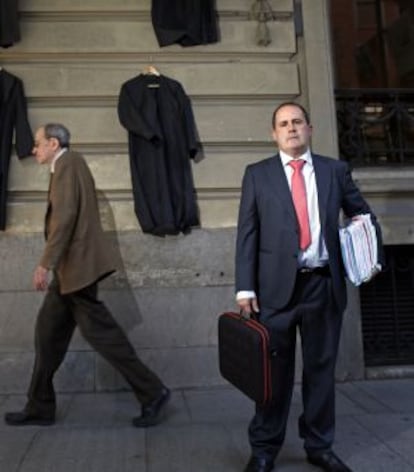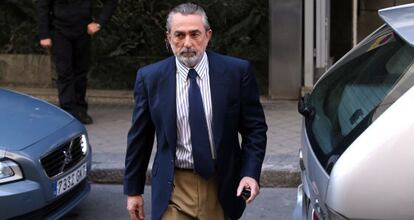€119 for tackling Spain’s biggest corruption case in recent memory
Court-appointed attorney defending main Gürtel probe suspect has only received a pittance

Juan Antonio Gragera, an attorney, was sitting in his office on September 25, 2014, preparing divorce proceedings for a client.
Around 8pm, the fax machine spat out a document informing him that he would be the official court-appointed counsel for a new client. The name sounded familiar – perhaps someone he had defended earlier? It was possible, since Gragera had been a public defender since 1996.
It took a while before it finally dawned on him who the new client was. Suddenly nervous, he spent the next hour pacing around the block. This fax message was going to change his life.
The name on the document was Francisco Correa, the main suspect in the Gürtel case. Correa’s surname, loosely translated into German as Gürtel, was synonymous with the biggest corruption case to hit Spain in recent years.
It would still be a few days before Gragera really took in the full scope of what was coming: a seven-year investigation encompassing 700,000 pages of reports divided into 2,000 volumes, 187 people under scrutiny, and 147 official requests for information issued to 21 different countries.
The seven-year probe encompasses 700,000 pages of reports, 187 suspects, and 147 official requests for information
The 48-year-old Gragera, whose legal career spans a quarter of a century, begins his tale inside the office of the law firm where he works, on Madrid’s Velázquez street. Although he insists he will not be discussing details about his client, he agrees to explain what it was like for a simple public defender at the High Court to get involved in a case of this magnitude.
“In theory it’s just another case,” he says. “But it bogs down my other work and I have to perform miracles to help my other clients.”
Like most other court-appointed attorneys, Gragera juggles his private law work with his public counseling. Around a third of his clients are people who cannot afford to pay for their own legal defense.
43,000 public defenders
There are around 43,000 lawyers in Spain who have signed up to work as public defenders, according to figures released by the General Council of Spanish Lawyers.
The state's investment in free justice is €4.72 a year per citizen, for a total of €223 million in 2013.
The Council complains that this investment has been cut back by over €43 million over the last four years, mostly by reducing counsels' pay. The average payment per case is €125, according to the same source.
This is Correa’s case as well. Once a behind-the-scenes power broker who hobnobbed with Spain’s leading conservative politicians, Correa’s assets were seized by the courts following his arrest in 2009. His earlier defense lawyer, José Antonio Choclán – one of the country’s most prestigious criminal law experts – dropped the case when it became clear that he would not be getting paid.
Defending Correa, the alleged leader of a business network that bribed elected officials to secure government contracts across Spain, will not bring Gragera much more money than what he makes with simple court-appointed cases.
To date, the Madrid regional government has paid him net €119.07 (gross €147). His check came through on March 23 of this year, six months after he started working on the case, and it represents 70 percent of the entire amount he is set to make (€210). But the remainder will not be paid until the legal proceedings are over, even if that is several years from now.
At that point, he will be eligible for a €315 supplement because of the special nature of the case, plus €19 for every 1,000 pages of court papers, and €57 for every day the hearing continues after the third day.
By comparison, private attorneys who specialize in corruption cases charge more than €100,000 a year.

“This case requires special economic resources,” says Gragera. “To begin with, there is a lot of travel required. But above all, what I need is people – colleagues to help me review all the documents in the case, including those generated each day. I would also need a substitute to sit in for me every time I am called into the High Court, and again when the trial begins. That would allow me to keep my office open and see to the rest of my court-appointed and private clients.”
But despite his financial straits, Correa’s defense lawyer sees a positive side to the situation. “I view it like a master’s program. It’s really great training.”
What struck him most the first time he went to the High Court as Correa’s new representative was the office where the case was being handled.
Fighting for better pay
For years, public defenders have been demanding decent pay in order to guarantee a good defense for their clients. Without this, they feel, the concept of free justice for those who cannot afford a private defense is in danger.
The protests have been increasing over this past year. In Madrid, for instance, court-appointed attorneys took several steps to pressure regional authorities into raising their rates and paying them on time. In March, they only dealt with urgent cases or those involving an individual under arrest. In April, they organized a sit-in. Their most recent protest involved hanging their robes on the façade of the Bar Association.
And then there are the large-scale cases such as Gürtel. "That's a case of procedural elephantiasis," says Paulino Pérez, who represents one of the engineers aboard the Prestige, an oil tanker that sank off the Galician coast in 2002, causing a major oil spill.
"You will never be compensated for your efforts and for the time you take away from your family or from your other work," adds Pérez, who spent a year working almost exclusively for this client for less than the €18,000 he had been promised.
“I saw a sign with the word Gürtel on it. I realized there were a lot of people working exclusively on this case. I couldn’t compete with that,” says Gragera, who spent the day before the interview seeing five clients in connection with his public defense work.
Just going over the Gürtel-related documents that come in every day represents an extra hour of work, he figures. The case also takes up his holidays, meaning that he has less time to spend with his wife and three children.
Gragera recently requested from Judge José de la Mata a one-month extension to prepare his client’s defense presentation. His petition underscored “the extraordinary complexity of the case and the lack of technical and economic resources.”
“I don’t think my client’s right to a legal defense is being violated because he has a court-appointed attorney,” he says. “But this right is not fully guaranteed if we are not given the same resources, which we are not. It’s not the same consulting all the paperwork by poring over thousands of pages or doing it with technological tools, which other private lawyers have access to.”
Gragera has explained his situation to the Bar Association, whose representatives are working with the Justice Ministry to try to solve some of those problems. A dozen public defenders are in a similar situation to Juan Antonio Gragera after also having parts of the Gürtel case dropped in their lap. The lawyers have met to coordinate their actions and present a united front to the court.
When the fax came through, eight months ago now, some of Gragera’s colleagues told him not to worry, that his client would very likely ask for his consent to be defended by another private attorney. But so far, Gragera is the only lawyer in charge of defending Francisco Correa.
Tu suscripción se está usando en otro dispositivo
¿Quieres añadir otro usuario a tu suscripción?
Si continúas leyendo en este dispositivo, no se podrá leer en el otro.
FlechaTu suscripción se está usando en otro dispositivo y solo puedes acceder a EL PAÍS desde un dispositivo a la vez.
Si quieres compartir tu cuenta, cambia tu suscripción a la modalidad Premium, así podrás añadir otro usuario. Cada uno accederá con su propia cuenta de email, lo que os permitirá personalizar vuestra experiencia en EL PAÍS.
¿Tienes una suscripción de empresa? Accede aquí para contratar más cuentas.
En el caso de no saber quién está usando tu cuenta, te recomendamos cambiar tu contraseña aquí.
Si decides continuar compartiendo tu cuenta, este mensaje se mostrará en tu dispositivo y en el de la otra persona que está usando tu cuenta de forma indefinida, afectando a tu experiencia de lectura. Puedes consultar aquí los términos y condiciones de la suscripción digital.








































